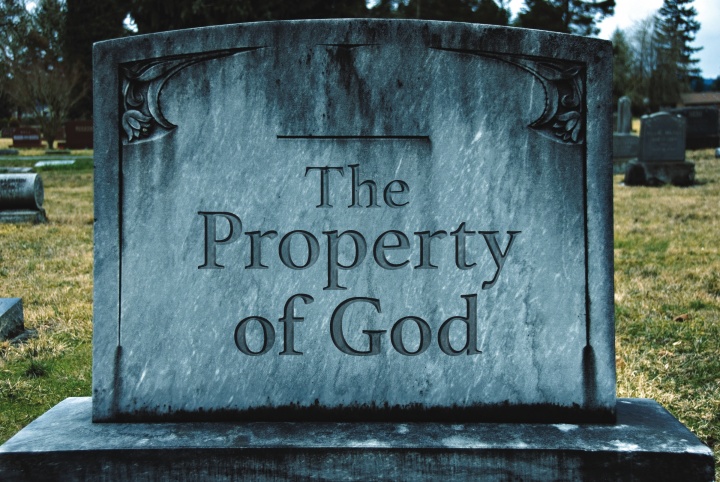Follow Me
Whom Do You Belong To?
Downloads
Follow Me: Whom Do You Belong To?

You can learn a lot when visiting a cemetery. One thing you take in is how quiet the grounds are—after all, the residents are not saying much. There’s also the realization that death does not pick and choose those who join its ranks. It simply swallows up all humanity.
Many of those buried under the manicured lawns were perhaps acquainted with portions of Ben Franklin’s quip that “in this world nothing can be said to be certain, except death and taxes.” Perhaps they had nonetheless pushed that out of mind, some even with no sense of accountability. Yet still their lives all ended—and rarely in a time of their choosing.
Recently I learned more about life in paying respects at my parents’ resting spot. On leaving, I stumbled on an amazing tombstone. Like all markers it had a name and dates of birth and death divided by a dash, but it was the epitaph below that grabbed my attention. It proclaimed all I needed to know about the quietness of the dash above. It read “The Property of God.”
That was it—and it was everything. Four simple words defined this individual’s focus in life. And they expressed a great truth we all need to understand about God’s calling. Here before me was a gift bequeathed to me in the moment, a powerful reminder of what we become in responding to Jesus Christ’s welcoming invitation of “Follow Me.”
What does “The Property of God” mean?
The word “property,” which first caught my attention here, demands careful unpacking. The clear sense was that of ownership—being owned by God and belonging to Him as a possession. Many would be hesitant to use such terminology or to accept it. Property? Really? In our current society, why would someone desire to tell all who pass by that he or she was owned?
Humanly it might seem repugnant. On the surface it seems to have echoes of human bondage. But what did it mean to the deceased individual? And what may we, the living, derive from Scripture regarding the life and times of Jesus and His early followers?
Rome ruled the Western world in the first century A.D. Historians estimate that the Italian peninsula’s population was 40 to 50 percent slaves, and in the remainder of the empire perhaps 10 percent were slaves. Slavery was part and parcel of the times.
Slaves were stationed among all levels of society. Whether secretaries in the imperial household, teachers, artists, field hands, miners or galley rowers, they all had one thing in common—they belonged to someone else. They were property to carry out someone else’s bidding and not their own.
This was the world of the Apostolic Scriptures or New Testament, written in the Greek language. They refer often to slaves. But subsequent Bible translations have softened the reality of the times and the fullness of the intent by using more neutral-sounding English words such as “servant,” “bondservant,” “bondman” and “bondmaid.”
Consider how Vine’s Complete Expository Dictionary of Old and New Testament Words breaks down the original Greek word translated into these terms: “doulos . . . from deo, ‘to bind,’ ‘a slave,’ originally the lowest term in the scale of servitude, came also to mean ‘one who gives himself up to the will of another’” (1985, p. 73).
This is the sense of being the property of another—even the property of God. Of course God sees us as more than property, for we belong to Him as His very own children. But that does not change the fact that we are still His property, He being our Owner and Master—albeit a Master who loves us completely.
Jesus did the unthinkable
What can we learn from the greatest Teacher of all time regarding not only who He was and what He said, but what He practiced throughout His human existence? Knowing Him and becoming like Him as we accept His invitation of “Follow Me” are two different levels of experience, and we must understand both.
Growing up, Jesus would have been familiar with Psalm 24:1: “The earth is the Lord’s, and all its fullness, the world and those who dwell therein.” He fully understood the reality of God as Creator so that all that exists, whether animate or inanimate, belongs to Him. Simply put: It is all God’s property.
But there is more to glean. In Jesus’ uncreated preexistence as God, the Word who was God with the Father, all things were created through Him (John 1:1-3, 14). “For by Him [Jesus] all things were created that are on earth, visible and invisible . . . All things were created through Him and for Him” (Colossians 1:16). As God the Creator along with the Father, Jesus owned everything along with the Father. Heaven and earth were Their shared property!
And then the divine Word performed the humanly unthinkable—He became one of us. For “though he was God, he did not think of equality with God as something to cling to. Instead, he gave up his divine privileges; he took the humble position of a slave and was born as a human being. When he appeared in human form, he humbled himself in obedience to God and died a criminal’s death on a cross” (Philippians 2:6-8, New Living Translation, emphasis added throughout).
This passage encapsulates where He came from, the state in which He arrived, the way in which He existed as the Son of Man—taking on the role of a humble, obedient slave—and how He departed the human experience. He became all of us and displayed firsthand how we can become more than we could ever be on our own—in submitting our life as the property of God.
Christ’s life was purposeful and not accidental. He lived every moment by divine design and obedience. His purpose and calling to be our Savior owned Him and filled Him up. As the Son of Man in this human existence, He belonged to God the Father and in His own words proclaimed, “My food is to do the will of Him who sent Me” (John 4:34). Even in the most challenging moments of His life, with death just around the corner, He remained steadfastly obedient when He told our Heavenly Father, “I want your will to be done, not mine” (Mark 14:36, NLT).
His purpose was eternal in scope. He came and died “that they [you and I] may have life, and that they may have it more abundantly” (John 10:10). His belonging to His and our Heavenly Father and belonging to Their joint purpose broke our bondage to Satan, our bondage to sin and our bondage to self-aggrandizement that lurks within us. Peter plainly tells us that “you were not redeemed [ransomed beyond our capabilities to do so] with corruptible things, like silver or gold, from your aimless conduct . . . but with the precious blood of Christ, as of a lamb without blemish and without spot” (1 Peter 1:18-19).
“You were bought at a price”
Building on this purchase from death to life, the apostle Paul sums it up in 1 Corinthians 6:19-20, reminding all who would heed the invitation of “Follow Me”: “Do you not know that your body is the temple of the Holy Spirit [which] is in you . . . and you are not your own? For you were bought at a price; therefore glorify God in your body and in your spirit, which are God’s”—that is, which belong to God.
All the early purveyors of the gospel came to understand and accept this God-given role when they accepted the invitation of “Follow Me.” Scriptures such as Romans 1:1, 2 Peter 1:1 and James 1:1 plainly show that Paul, Peter and James (Jesus’ half-brother) viewed themselves as Christ’s slaves (doulos in Greek, meaning a slave belonging to someone else and not just a servant, as often assumed). This is how they introduced themselves as they introduced their messages. And all of us are to likewise be slaves to God and His righteousness for our ultimate good (Romans 6:16-23).
As we understand and hopefully embrace what it means to be “The Property of God,” we need to ask ourselves a simple question: What part of our lives have we not yet given over to God?
Jesus Christ presents us this non-flexible equation: “No one can serve two masters” (Matthew 6:24). Again, the call of “Follow Me” is more than simply who you know or answering the question of “Who do you say that I am?” (Matthew 16:15). It is becoming like the Master Teacher—the same One who proclaimed in words and by example: “I can of Myself do nothing. As I hear, I judge; and My judgment is righteous, because I do not seek My own will but the will of the Father who sent Me” (John 5:30).
Jesus “belonged” to His Father in every way and placed His life in His care to the very end when He prayed, “Father, into Your hands I commit My spirit” (Luke 23:46). As you walk away from reading these words, think on this question: How will your living legacy read? Will it reflect that you are “The Property of God”?
